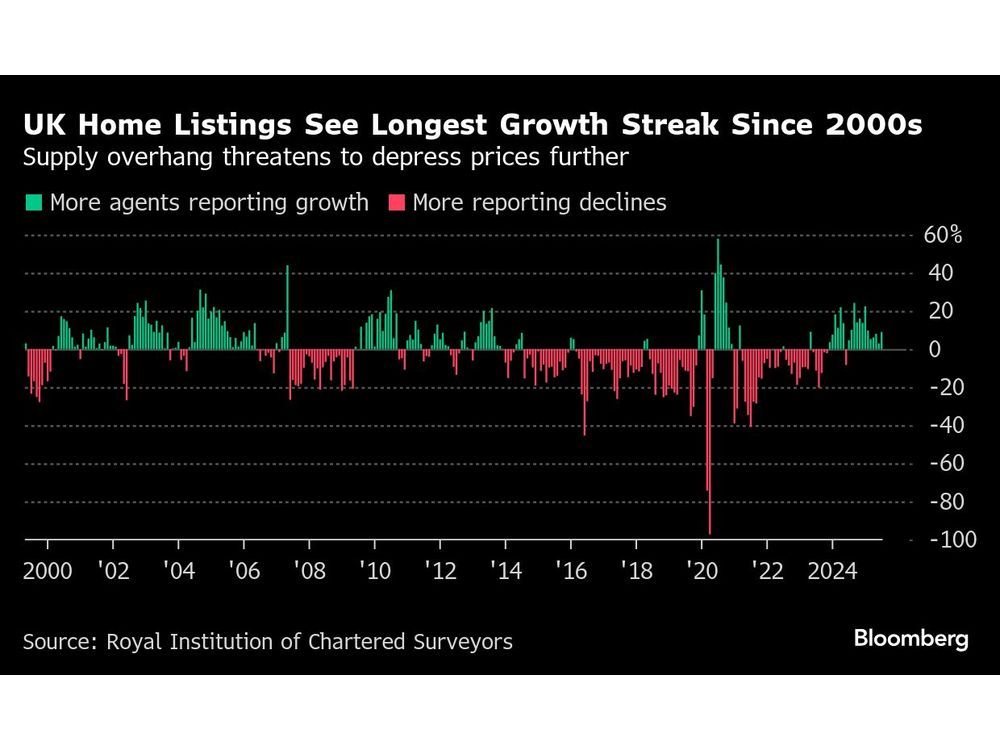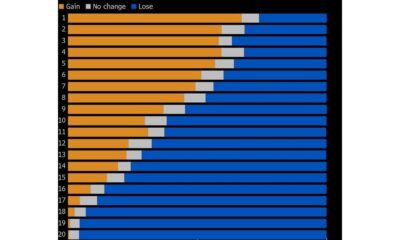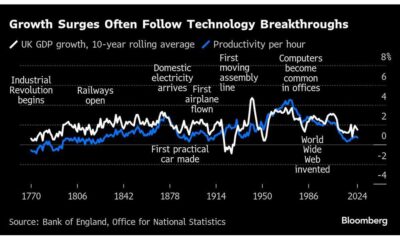Top Stories
UK Home Listings Surge to Record High, Prices Face Pressure

UPDATE: UK home listings have reached a record high, marking the longest increase since 2004, according to the latest survey from the Royal Institution of Chartered Surveyors (RICS). This surge in supply is putting significant downward pressure on property prices as buyers remain cautious amidst a market overwhelmed with options.
In a developing situation, the RICS index reveals that net positive vendor instructions have persisted since July 2024, indicating that more real estate agents are witnessing an increase in supply than those observing a decrease. This trend has surpassed levels seen during the 2009 financial crisis, causing alarm among industry experts.
The uptick in listings is largely attributed to landlords selling rental properties in anticipation of looming cost increases from regulatory changes. The Labour government is set to introduce measures such as the upcoming Renters Rights Bill, aimed at enhancing tenant protections, which has left landlords anxious about potential profitability.
Real estate agents fear that this oversupply could trigger a vicious cycle. As sellers lower prices to attract buyers, the very market recovery that many hope for could be derailed. “The more supply comes on, the longer things take to transact because buyers get analysis paralysis,” stated Tom Bill, head of UK residential research at Knight Frank. “You just try and view everything and you become choosy, which slows everything down.”
The data is alarming. A report from property website Rightmove shows that the number of houses for sale rose by 10% year-on-year to a decade-high in August 2024. Approximately one-third of these listings have seen price reductions since hitting the market, with average asking prices dropping by £11,000 ($14,850) over the sluggish summer months.
Mortgage lender Nationwide has also confirmed that annual price growth has barely budged, indicating a stagnant market. “We expect sellers to continue pricing competitively to entice buyers, which will keep prices muted,” commented Colleen Babcock, a property expert at Rightmove.
Despite improvements in affordability, buyers remain hesitant due to escalating transaction taxes, sluggish wage growth, and uncertainty surrounding future interest rate cuts by the Bank of England. This cautious approach is exacerbating the oversupply, particularly from landlords exiting the rental market.
The Labour government’s proposed overhaul of energy regulations, requiring rental properties to meet a minimum C rating by 2030, adds further strain. Almost 3 million rental properties require significant upgrades, costing an estimated £8,074 each, according to Rightmove analysis. The increasing cost of mortgages, now around 4.5%-5%, makes the rental market less attractive for many landlords.
Economic analysts warn that the government’s potential tax increases in Chancellor of the Exchequer Rachel Reeves’ upcoming autumn budget could further complicate the landscape. Reports suggest plans to apply national insurance to rental incomes, which may force landlords to pass on costs to tenants, ultimately driving up rents.
While the rise in listings may provide opportunities for aspiring homeowners, the negative implications for renters are palpable. Rent inflation has decreased from the pandemic highs, yet affordability has worsened due to stagnant wages. Agents surveyed by RICS anticipate rents to continue climbing over the next three months.
“This targeting of landlords won’t cost the government many votes, but such moves invariably end up hurting tenants,” warned Bill.
As the situation unfolds, homebuyers, renters, and industry stakeholders will need to stay alert to the evolving dynamics of the UK property market. With uncertainty looming, the impact on prices and availability will be crucial to watch in the coming months.
-

 Politics4 weeks ago
Politics4 weeks agoSecwepemc First Nation Seeks Aboriginal Title Over Kamloops Area
-

 World5 months ago
World5 months agoScientists Unearth Ancient Antarctic Ice to Unlock Climate Secrets
-

 Entertainment5 months ago
Entertainment5 months agoTrump and McCormick to Announce $70 Billion Energy Investments
-

 Science5 months ago
Science5 months agoFour Astronauts Return to Earth After International Space Station Mission
-

 Lifestyle5 months ago
Lifestyle5 months agoTransLink Launches Food Truck Program to Boost Revenue in Vancouver
-

 Technology3 months ago
Technology3 months agoApple Notes Enhances Functionality with Markdown Support in macOS 26
-

 Lifestyle3 months ago
Lifestyle3 months agoManitoba’s Burger Champion Shines Again Amid Dining Innovations
-

 Top Stories2 months ago
Top Stories2 months agoUrgent Update: Fatal Crash on Highway 99 Claims Life of Pitt Meadows Man
-

 Politics4 months ago
Politics4 months agoUkrainian Tennis Star Elina Svitolina Faces Death Threats Online
-

 Sports5 months ago
Sports5 months agoSearch Underway for Missing Hunter Amid Hokkaido Bear Emergency
-

 Politics5 months ago
Politics5 months agoCarney Engages First Nations Leaders at Development Law Summit
-

 Technology5 months ago
Technology5 months agoFrosthaven Launches Early Access on July 31, 2025





















